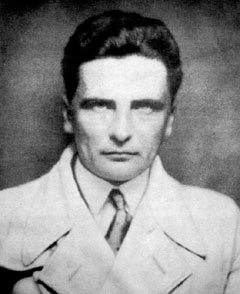Prominent Poles
Stefan Grot-Rowecki (pseudonym: Grot), military man general, leader of AK(Armia Krajowa=Home Army), journalist.

Born: December 25, 1896, Piotrkow Trybunalski, Russian partition of Poland
Died: August 2, 1944, murdered at Sachsenhausen concentration camp, Germany.
Early days. Father- Stefan, an official at a credit institution; mother- Zofia nee Chrzanowska. In 1906 he went to Jacobson's private high school (gimnazjum).
In 1911 he joined Polish Scouts. In 1913 he moved to Warsaw to Electrical Engineering at Wawelberg and Rotwand's Technical School. In his home town he was one of the organizers of a secret scouting organization.
WWI. During World War I he was conscripted into the Austro-Hungarian army and also in 1914 into the First Brigade of the Polish Legion. He was interned in August 1917 after the majority of his unit had refused to pledge loyalty to the Emperor of Austria. In February 1918, he was released from the internment camp in Beniaminow and joined, organized by the Germans, the Polnische Wehrmacht. After the establishment of the newly independent Poland, he joined the Polish Army.
Polish-Soviet War. Rowecki fought in the Polish-Soviet war (1919-1920) and was advanced to the rank of a major.
Independent Poland 1918-1939. After the war, he remained in the army and organized the first military weekly periodical (Przeglad Wojskowy). From 1930 to 1935, he commanded the 55th Infantry Regiment in Leszno. Till 1930 he was working for the Bureau of Rigid War Council. He was also a member of editorial Boards of several military periodicals. In 1926 he advanced to board certified lieutenant colonel. In 1930 he became commanding officer of the 55 infantry regiment in Leszno and was promoted to a colonel. He had the reputation of a tough but fair man. In 1936 he became the commander of the Brigade of the Frontier Protection Corps. In June 1939 he was given the task of forming the Warsaw Armored Motorized Brigade.
WWII. On 1 September 1939 the Nazi-German Army invaded Poland. Rowecki's unit did not reach full mobilization, however it did take part in the defense of Poland. After the Polish defeat, Rowecki managed to avoid capture and returned to Warsaw. In October 1939, he became one of the leaders, then in 1940 commander, of the Zwiazek Walki Zbrojnej. In May 1940 he was advanced to the rank of brigadier general. From 1942, he was commander of the Armia Krajowa (Home Army). In 1941, Rowecki organized sabotage in the territories east of the Polish pre-war borders. In November 1941 he held a secret meeting with Marshal Edward Rydz-Smigly. It is worth mentioning that Rowecki was the only officer in Polish history decorated 8 times with the Cross of Valor. Rowecki put on a very high level of reliability and value the spying activity of Armia Krajowa. On 30 June 1943 he was arrested by the Gestapo in Warsaw and sent to Berlin, where he was questioned by many prominent Nazi officials (including Ernst Kaltenbrunner, Heinrich Himmler and Heinrich Mueller). He was offered an anti-bolshevik alliance, but refused. He was probably executed in August 1944 in Sachsenhausen on the order of Heinrich Himmler. Rowecki's arrest was in all likelihood due to his betrayal by members of the Home Army who collaborated with the Gestapo: Ludwik Kalkstein "Hanka", Eugeniusz Swierczewski "Genes" and Blanka Kaczorowska "Sroka". They were sentenced to death for high treason by the Secret War Tribunal of the Polish Underground State. The sentence on Eugeniusz Swierczewski was carried out. Kalkstein received protection from the Gestapo and was not harmed. He fought in a Waffen SS unit during the Warsaw Uprising of 1944 under the name of Konrad Stark (he was of German descent). After the war, he was recruited as an agent by the Polish Urzad Bezpieczenstwa (Secret service). In 1982, he emigrated to France. Blanka Kaczorowska also survived the war. Her death sentence was not carried out because she was pregnant. After the war, she also worked as a secret agent for the Urzad Bezpieczenstwa. She emigrated to France in 1971.
Personal. He was married in 1920 to Sabina Paszkowska. They had one daughter: Irena. In 1932 he married Eugenia Borzychowska. They separated in 1940.
Awards and orders. Virtuti Militari Silver Cross (1923), Polonia Restituta IV class, Legion d'honneur Officers Cross (France 1937), Cross of Valor 8 times, 4 times for Polish-Soviet War and 4 times for Polish Defensive War of 1939, Cross of Merit I Class, Cross of Independence, Memorial Medal for the War 1918-1921, Virtuti Militari Golden Cross (1942), Armia Krajowa Cross, posthumously (1967), The Endurance Star, posthumously, Legion of Merit Commander, posthumously by Ronald Reagan (USA 1984), Order of the White Eagle, posthumously (1995).
Main source:
Wikipedia
Text is available under the Creative Commons Attribution-ShareAlike License; additional terms may apply
Other sources:
Wikimedia
Stefan Grot-Growecki (in Polish) by Lukasz Leszczynski, Krakow
Return to home page:
Prominent Poles
